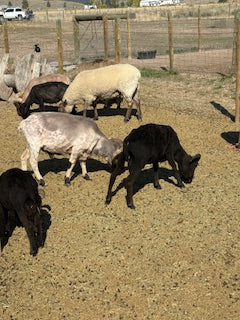
It's Just A Hobby-Why we need fibersheds
Share
I admit it. I’m one of those “podcast” people. I listen to them while driving, cleaning, working outside, weaving. For the most part I listen to history/true crime pods as I am a history teacher. But recently I have found a few (now defunct) pods about weaving that I voraciously binge whenever I have a chance.
One is simply called Weave. It is hosted by the owner of Gist yarns. The show stopped in 2023, but it has 123 episodes of fiber content. Even when the content does not relate to me, it’s relaxing to hear other people in the fiber world discussing their views.
The other is The Professional Weaver Podcast. Obviously I am not a pro weaver, nor am I a production weaver turning out 40 yards of fabric on my looms (but I can dream). It is this pod that leads my thoughts, and irritation, today. During the course of discussing the US yarn supply chain, the host and guest ventured into the coast of wool territory. First, I have to immediately claim that if you don’t understand wool prices and mechanics, maybe don’t podcast about it. Second, their concerns were valued but the understanding was way off. The basics of the conversation was that some large producers only get pennies on the dollar for their wool, which is often unavailable to consumers looking to buy fleeces to mill into yarn. Small producers, who do offer fleeces for processing, often charge much, much more for the fleeces. The host suggested that these small producers need to realize they are not a business, but own a few “pet” sheep as a hobby; therefore, they need to stop asking for so much.
Ok. Time for a few deep breaths. I will not admit the words that I said to the host as I was driving and listening to this conversation. Safely assume they PG-13 to say the least.
Honestly, how can people who make their living with fiber-the end process, have so little idea of what the front end of that process is. To break down their misunderstanding, most big operations are meat operations. They are raising sheep for slaughter. The wool they shear is often sent overseas as it is a by-product of the business. Meat is the product. These producers rarely have time to send fleeces into a mill and produce fiber products. It is simply not what they raise sheep for. (Of course there are many producers who do have large operations and run a wool side).
I am a small producer. I am not a hobby farmist. I worry about the same issues as meat producers: feed cost, minerals, birth weights, fertility, genetics. The difference is my product is wool. My by-product is meat, and because butchered sheep no longer produce wool, that meat is generally only consumed by my family. We shear twice a year, and we sell the wool in all forms from raw to roving to hand spun yarn. And no, I’m not charging pennies on the dollar for fleece that I produce-fleece that is the focus of our operations. Many factors go into that pricing (just like all businesses): demand, market prices, feed costs, shearer costs, supply available. When we advertise and bring fiber to show-it sells. Telling me my market is just fine with my prices.
Deep breath number two. These conversations are why I joined and believe in Montana Fibershed. Our mission :Montana Fibershed is a grassroots, non-profit organization that supports Montana-based natural fiber and dye systems. We seek to connect producers to end users of fiber, to encourage new and strengthen existing textile manufacturing systems in Montana, and to do so in regenerative and sustainable ways that support the health of our people, our soils, and the landscapes and economies that sustain us.
The Fibershed movement across the country is a vital step for all producers, regardless of size or end goal to find value in their fiber. It is also about more than sheep. Flax, hemp, alpaca, pygora goats-all fibers that need to be understood by the end process consumer-dare I say appreciated by the end process consumer.
Whether you are a front end producer, a back end maker, or someone who simply appreciates a well made fiber product, we are all in this together. Check out the Montana Fibershed site, come to a fiber festival, see what fibersheds across the country are accomplishing. Make a donation, buy a hand woven bag, buy local yarn. Because for those of us in the fiber business-it is so much more than a hobby.